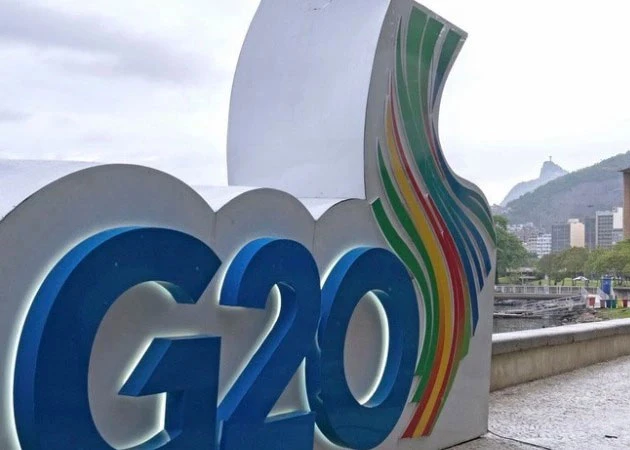G20 Ministerial Meeting: For global sustainable development
The G20 Ministerial Meeting, which is taking place in South Africa, is focused on mobilising the necessary resources and implementation means to achieve the United Nations Sustainable Development Goals (SDGs), amid many key sustainable development goals stalling or even regressing.
 |
| G20 logo in Rio de Janeiro (Brazil) last November. (Photo: Xinhua News Agency/VNA) |
Taking place in South Africa, the ministerial meeting of the Group of Twenty (G20) — the world’s leading developed and emerging economies — is focused on mobilising the necessary resources and implementation means to achieve the United Nations Sustainable Development Goals (SDGs), amid many key sustainable development goals stalling or even regressing.
The G20 represents nearly 70% of the world’s population and 80% of global GDP. However, in recent years, the group has faced considerable difficulties in reaching a common consensus. As the first African country to hold the rotating G20 presidency, South Africa is committed to promoting the priorities of the Global South, such as increasing climate change resilience and addressing public debt in developing countries.
This G20 forum, held under South Africa’s presidency and ending on July 25, centres around the theme “Unity, Sustainability, and Equality,” reflecting a commitment to a fair and resilient global recovery.
Maropene Ramokgopa, South African Minister for Planning, Monitoring and Evaluation, stated that the country would push for the G20 to make specific commitments to increase public investment in areas beyond national borders, such as health, climate change response, and eradication of hunger and poverty.
Previously, South African Foreign Minister Ronald Lamola warned of increasing global fragmentation, threatening unprecedented instability and disproportionately affecting low-income countries. He pointed out that strategic competition, economic decoupling trends, and proxy conflicts are weakening multilateral institutions and pushing the world into prolonged instability.
Lamola emphasised that these developments are exacerbating fragility in vulnerable regions while weakening the rules-based international order. He called on the G20 to play its part in promoting global peace and stability.
In its role as G20 Chair, South Africa warned that declining international cooperation and moves away from the rules-based global order pose serious threats to achieving the United Nations Sustainable Development Goals (SDGs) by 2030, particularly in eradicating hunger, extreme poverty, and responding to climate change.
Adopted by 193 member states in 2015, the SDGs set out 17 major goals across education, climate, gender equality, and many other fields. However, progress is slowing and at risk of reversal. According to South African Finance Minister Enoch Godongwana, development goals are being pushed out of reach by geopolitical risks, trade imbalances, and increasing trade barriers, while climate change continues to worsen the situation.
After ten years of implementation, many key goals are stalling or regressing compared to before the Covid-19 pandemic. The 2023 SDG Report shows that only about 35% of targets are progressing, while nearly 50% have stalled and the rest are regressing. Now, about 757 million people (9.1% of the global population) are living in hunger and more than 800 million in extreme poverty.
United Nations Secretary-General Antonio Guterres warned that the world is facing a global development emergency, with the public debt burden draining the resources needed to invest in people. The United Nations emphasised that without decisive and coordinated action, many goals will not be achieved on time.
South Africa called on the G20 to show global leadership and cooperate to tackle challenges, including rising trade barriers, especially as the policies of some major economies, such as the US, are affecting global trade order and could negatively impact global economic prospects.
To protect consumers, financial experts proposed that G20 central banks commit to maintaining independence and price stability. The G20 is also being urged to promote comprehensive and systemic solutions to effectively address public debt in low and middle-income countries, creating a solid financial foundation to achieve the Sustainable Development Goals on time.
NDO





READER COMMENTS